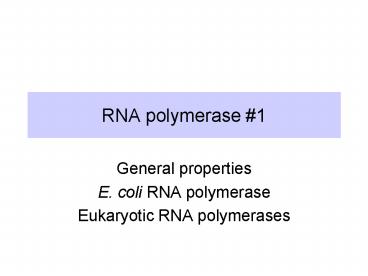RNA polymerase - PowerPoint PPT Presentation
1 / 22
Title:
RNA polymerase
Description:
Makes an RNA chain with a sequence complementary to the template ... Holoenzyme dissociates from promoter DNA with a half-time of hours (in absence of rNTPs) ... – PowerPoint PPT presentation
Number of Views:929
Avg rating:3.0/5.0
Title: RNA polymerase
1
RNA polymerase 1
- General properties
- E. coli RNA polymerase
- Eukaryotic RNA polymerases
2
Pathway for Gene Expression
3
Reaction catalyzed by RNA polymerase
- Catalyzes the synthesis of RNA directed by DNA as
a template transcription - Makes an RNA chain with a sequence complementary
to the template strand of DNA - Does NOT require a primer can start RNA
synthesis at a site on the DNA template
4
Sequential addition of ribonucleotides
Pyrophosphate PPi
5
E. coli RNA polymerase
- Synthesizes all classes of RNA
- mRNA
- rRNA
- tRNA
- Core a2bb catalyzes elongation of an RNA chain
- Holoenzyme a2bbs catalyzes initiation or RNA
synthesis specifically at a promoter
6
Two Definitions of Promoter
- 1. The sequence of DNA required for accurate,
specific initiation of transcription - 2. The sequence of DNA to which RNA polymerase
binds to accurately initiate transcription - In most cases, RNA polymerase binds to a DNA
sequence including the initiation site, but it
can be directed there by sequences flanking the
initiation site. Thus definition 2 can be a
subset of definition 1.
7
RNA polymerase at a promoter
a assembly and binds to UP bb form catalytic
center s binds -10 and -35 of promoter to confer
specificity during initiation
8
Determination of 3-D structure by electron
crystallography
9
3-D images of core and holoenzyme
Core
Holoenzyme
10
Holoenzyme for RNA polymerase from E. coli
11
Role of a subunit in assembly of RNA polymerase
and other functions
12
Mode of action of s factors
- The s factor causes RNA polymerase to be
selective in its choice of initiation sites by
affecting the dissociation rate of polymerase
from DNA. - Core dissociates from general DNA with a
half-time of 60 min use in elongation. - Holoenzyme dissociates from general DNA with a
half-time of 1 sec! - Holoenzyme dissociates from promoter DNA with a
half-time of hours (in absence of rNTPs).
13
Events at initiation of transcription
14
Transcription cycle
- Initiation
- Holoenzyme binds to the promoter, unwinds DNA,
and forms phosphodiester bonds between 7 to 12
nucleotides - Need s
- Elongation
- s dissociates
- Core elongates RNA with high processivity
- May use NusA
- Termination
- Polymerase dissociates from template DNA and
releases new RNA - Often use r.
15
Sites on RNA polymerase core
- Enzyme covers about 60 bp of DNA, with about 17
bp unwound transcription bubble. - The bubble must contact the active site for
polymerization. - At the beginning of the bubble, the DNA is
unwound, implicating a helicase activity. - At the end of the bubble, the DNA is rewound.
16
Effects of transcription on supercoiling of the
template
- The unwinding and rewinding of the DNA template
introduces positive supercoils ahead of the
polymerase and negative supercoils behind it. - Unwinding will decrease T by 1 for every 10 bp
unwound. Since DL0, DW-DT, and DW1 for every
10 bp unwound. - The opposite occurs upon rewinding. DT1 for
every 10 bp rewound, and thus DW-1 for every 10
bp rewound.
17
3 RNA polymerases in eukaryotes
- Name Makes
a-amanitin - RNA pre-rRNA insensitive
- Polymerase I
- RNA pre-mRNA very sensitive
- Polymerase II some snRNAs
- RNA pre-tRNA less sensitive
- Polymerase III other small RNAs
- some snRNAs
18
Subunit structure of eukaryotic RNA polymerases
- All 3 have multiple subunits (8 to 14 ).
- MW for each polymerase is about 500,000
- Some subunits are common to all 3 RNA polymerases
- All 3 RNA polymerases have subunits that are
homologous to the bacterial b, b and a subunits.
19
Subunits of yeast RNA Pol II
Approximate subunits per size
(kDa) polymerase role / comment 220 1 related
to b' 130 1 related to b 40 2 related to
a 35 lt 1 30 2 common to all
3 27 1 common to all 3 24 lt
1 20 1 common to all 3 14 2 10 1
20
Phosphorylation of CTD of large subunit
CTD has repeat of (YSPTSPT)26-50.
Model Phosphorylation of Pol IIa to make Pol IIo
is needed to release the polymerase from the
initiation complex and allow it to start
elongation.
21
3-dimensional view of yeast RNA Pol II
Both yeast RNA Pol II and E. coli RNA polymerase
core Have a similar shape and have the channel
for DNA template.
Images from Dr. S. Darst
22
RNA Pol II bound to DNA and general transcription
factors































